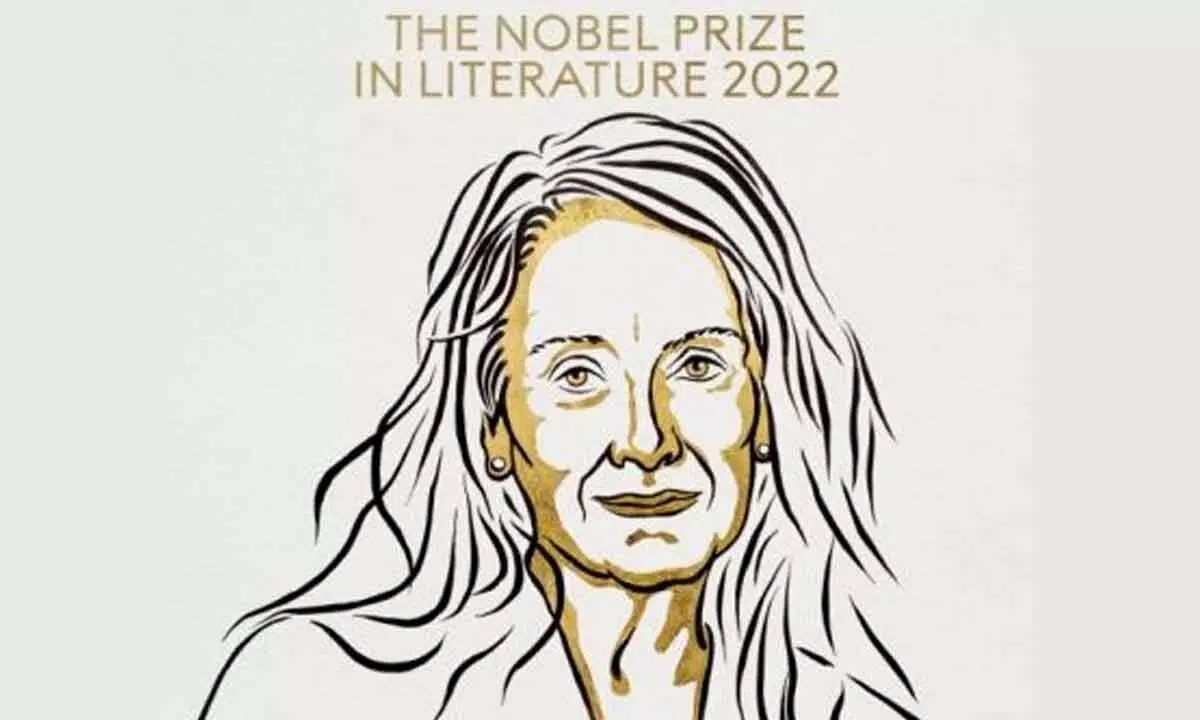Live
- Educational Trips in South Kanara Put on Hold Following Murudeshwar Drowning Incident
- Karnataka Temple Embraces Mechanical Elephant for Cruelty-Free Ceremonies
- Temple modelled after Ram Mandir to be constructed in US
- Property dealer shot dead in broad daylight in Ranchi
- Maharashtra: CM Fadnavis expands Cabinet; inducts 39 ministers
- Winter Session of UP Assembly from Dec 16; CM seeks cooperation of all parties
- AIADMK executive council meet passes sixteen resolutions, vows to make Edappadi CM again
- Manchu Family Feud Resurfaces in Jalpally
- Kerala Hindu leader gifts Rig Veda to Pope Francis
- 35 miners trapped under rubble in Afghanistan
Just In
French writer Annie Ernaux awarded Nobel Prize in literature


French author Annie Ernaux, who has mined her own biography to explore life in France since the 1940s, was awarded this year's Nobel Prize in literature on Thursday for work that illuminates murky corners of memory, family and society.
Stockholm: French author Annie Ernaux, who has mined her own biography to explore life in France since the 1940s, was awarded this year's Nobel Prize in literature on Thursday for work that illuminates murky corners of memory, family and society.
Ernaux's autobiographical books explore deeply personal experiences and feelings – love, sex, abortion, shame – within a changing web of social and class relationships. Much of her material came out of her experiences being raised in a working-class family in the Normandy region of northwest France.
The Swedish Academy said Ernaux, 82, was recognised for "the courage and clinical acuity" of her writing. Anders Olsson, chairman of the Nobel literature committee, said Ernaux is "an extremely honest writer who is not afraid to confront the hard truths". "She writes about things that no one else writes about, for instance her abortion, her jealousy, her experiences as an abandoned lover and so forth. I mean, really hard experiences," he said after the award announcement in Stockholm.
"And she gives words for these experiences that are very simple and striking. They are short books, but they are really moving." Ernaux is just the 17th woman among the 119 Nobel literature laureates and is the first French literature laureate since Patrick Modiano in 2014.
One of France's most-garlanded authors and a prominent feminist voice, she expressed surprise at the award, asking a Swedish journalist who reached her by phone: "Are you sure?" "I was working this morning and the phone has been ringing all the time but I haven't answered," she told the TT news agency. Ernaux told Swedish broadcaster SVT that the award was "a great honour" and "a very great responsibility".
Olsson said Ernaux had used the term "an ethnologist of herself" rather than a writer of fiction. Her more than 20 books, most of them very short, chronicle events in her life and the lives of those around her. They present uncompromising portraits of sexual encounters, abortion, illness and the deaths of her parents. Olsson said Ernaux's work was often "written in plain language, scraped clean". Ernaux describes her style as "flat writing" — aiming for a very objective view of the events she is describing, unshaped by florid description or overwhelming emotions. Ernaux worked as a teacher before becoming a full-time writer. Her first book was "Cleaned Out" in 1974. Two more autobiographical novels followed – "What They Say Goes" and "The Frozen Woman" – before she moved to more overtly autobiographical books.
In the book that made her name, "La Place" (A Man's Place), published in 1983 and about her relationship with her father, she writes: "No lyrical reminiscences, no triumphant displays of irony. This neutral writing style comes to me naturally." "Shame," published in 1997, explored a childhood trauma, while "Happening", from 2000 depicts an illegal abortion. Her most critically acclaimed book is "The Years," published in 2008, which described herself and wider French society from the end of World War II to the 21st century.
Unlike in previous books, in "The Years," Ernaux wrote in the third person, calling her character "she" rather than "I". The book received numerous awards and honours, and Olsson said it has been called "the first collective autobiography". "A Girl's Story," from 2016, follows a young woman's coming of age in the 1950s.
The Nobel literature prize has long faced criticism that it is too focused on European and North American writers, as well as too male-dominated. Last year's prize winner, Tanzanian-born, UK-based writer Abdulrazak Gurnah, was only the sixth Nobel literature laureate born in Africa.

© 2024 Hyderabad Media House Limited/The Hans India. All rights reserved. Powered by hocalwire.com






